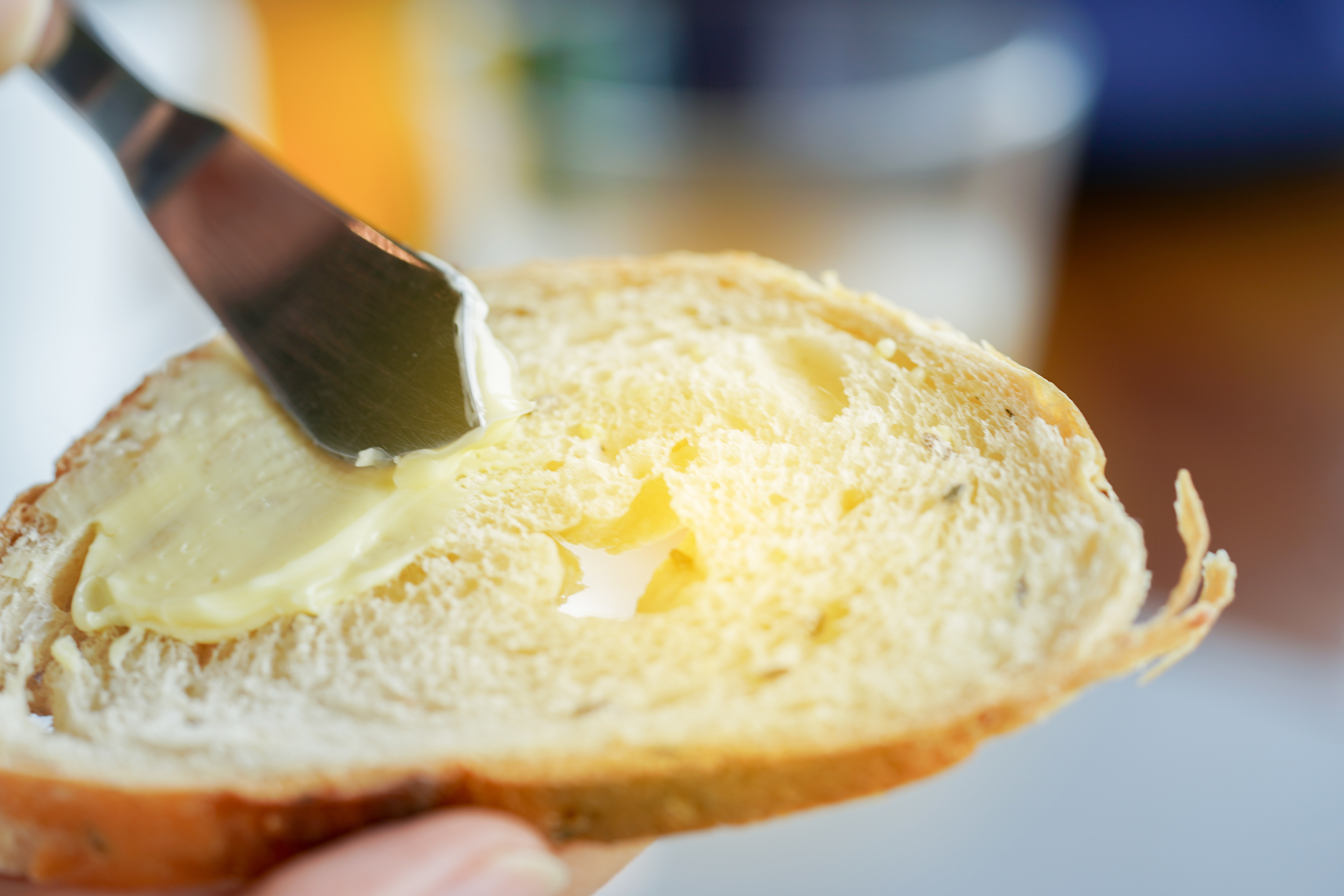
Margarine is a butter alternative that resembles it in appearance, character, and composition. It is composed of about 80 percent fat and 16 percent water. It can also be made with several different kinds of oil. The process in which it is made is called hydrogenation. Other ingredients may be added in order to increase taste, flavor, aroma and enhance its nutritional properties.
These ingredients are either water-soluble or fat-soluble. Water-soluble ingredients include salt and preservatives, while the fat-soluble ingredients are emulsifiers, antioxidants, lecithin, flavor, natural coloring compounds, and vitamins. Emulsifiers are a substance that secures an emulsion, particularly processed foods. Antioxidants are man-made substances that help defend cells from damage and lecithin is a substance used to smooth food textures.
Brief History
Margarine was originally developed as an alternative to butter in mid-century France. By the 19th century, butter had become common in the diet of those who lived off the land, but very expensive for those who did not. Napoleon the 3rd presented an award for anybody that could come up with a valid and affordable alternative to butter. He wanted an alternative that was assessable to the lower-class citizens and the armed forces. In 1869 the award went to Hippolyte Mege-Mouriez. However, it still took quite a while for margarine to become popular in the United States.
Nutritional Facts
Margarine has slightly less fat than butter with about 11 g per tablespoon. This breaks down into 2.2 g of saturated fat, 3.5 g of polyunsaturated fat, 6 g of monounsaturated fat, and 2.1 g of trans fat. It has about the same calories per tablespoon of butter with about 100 calories per serving. The presence of trans-fat in this margarine makes it risky for consistent use. This is because trans-fat has been attributed to increased risk of heart disease and other chronic illnesses. Margarine also has 3 mg of potassium and 0.1 g total carbohydrates. It has no value in cholesterol, sodium, dietary fiber, sugar, or protein. It also lacks value in Vitamin D as opposed to butter. However, it does contain 10 percent of Vitamin A. Vitamin A is the most present in this product, with 1 tablespoon providing about 10% of your Reference Daily Intake (RDI). Vitamin A helps to maintain teeth health, as well as soft tissue, white blood cells, and your immune system. Unfortunately, margarine provides no calcium, cobalamin, vitamin c, iron, vitamin B-6, or magnesium. All of which are required in your daily intake.
Amount Per – 1 tbsp (14.2 g)
- Calories – 102
- Total Fat – 11 g
- Saturated fat – 2.2 g
- Polyunsaturated fat – 3.5 g
- Monounsaturated fat – 6 g
- Trans fat – 2.1 g
- Potassium – 3 mg
- Total Carbohydrates – 0.1 g
- Vitamin A – 10%
Types of Margarine
Table Margarine
Table margarine is the most common type of margarine that you can find at any grocery store. It can be made at home in which case you can make it much lower in fat than store-bought products. It is commonly used for several pastries, doughnuts, cakes, cookies, as well as being great for a spread.
Industrial Margarine
Industrial Margarine is a tub of all-purpose margarine that good for taskS related to baking. It has added color and flavor, which makes for a premium final product. It has several specialty fats that are added to give bakery products much more texture and taste. It does this by providing tenderness and flakiness. It makes the final product more savory, flavorful, and creamy.
Pastry Margarine
Pastry margarine is made to be more plastic than traditional margarine. This makes it much easier for chefs to use. However, it also provides a good foundation for the pastry itself. Unfortunately, the fat content in pastry margarine is normally much higher than in traditional margarine; more specifically the saturated fat. It is overall superior to other forms of margarine if being used for baking.
Whipped Margarine
Whipped margarine has several upsides to its traditional counterpart. It improves qualities such as increased rate of flavor release, stability, bread coverage, resistance to molding, and it is much better to fry with. Just like whipped butter it can be made at home and is easier to melt and spread with. This makes it great for large gatherings.
Vegan Margarine
Vegan margarine is a tub of margarine that contains absolutely no dairy or animal products. While margarine is not normally dairy-based, it does contain small amounts of animal products. Check the labels carefully and be sure that your vegan margarine is free of lactose, casein, and caseinate. Casein is the primary protein found in milk and caseinate is kind of like its cousin. Casein is also found in many processed food and paint adhesives, which is very disturbing. Another great thing about vegan margarine is that it greatly reduces the amount of trans-fat found in traditional margarine.
Margarine vs. Butter
Butter is primarily made from dairy milk and salt, while margarine can be made with several different ingredients. Margarine can be made with anything from an edible animal to vegetable oil, while its liquid substances can be made from milk, water or a protein mixture.
Butter is normally made by churning cow milk. This churning process separates the butterfat from the buttermilk. However, margarine is made through a process called hydrogenation. In this process hydrogen gas is added to the ingredients under pressurized conditions. The hydrogen particles merge with the oil, which will make it melt. This makes the substance less likely to be contaminated through oxidation. Then an emulsifying agent is added in order to help the chemicals bond easily. The end result is a product that is a semi-solid, which means it is neither a liquid nor solid but a combination.
Is Margarine Healthy
Margarine does have some heart-healthy aspects to it. However, with the high presence of trans-fat, it can still be associated with an increased risk of heart disease. Vegan margarine is likely the best way to go but even so should be used in moderation. Once upon a time, it was thought that margarine was superior to butter health-wise, but in recent times that theory has been debunked. However, if you have any kind of intolerance to dairy products, then margarine is the better choice.
